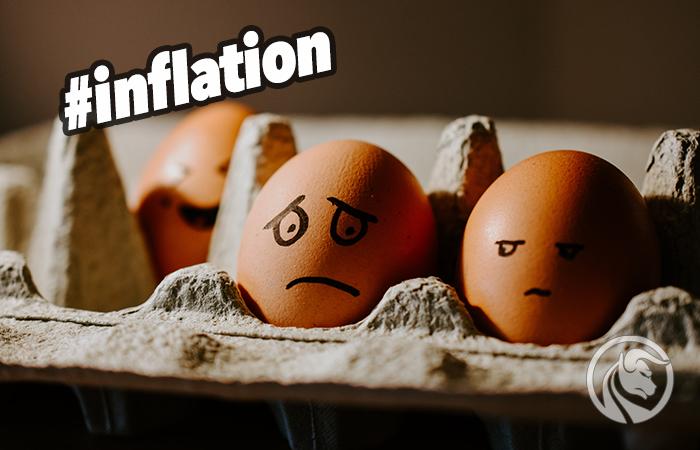Inflation is driving two big central banks to act
Inflation both in the euro area and in the United States is breaking records. This, in turn, may induce central banks to accelerate interest rate hikes. However, not because the rises in commodity prices will stop the rally in prices, but because they reduce negative real interest rates.
At its meeting in March 2022, European Central Bank The asset purchase schedule for the coming months unexpectedly accelerated and said the APP could end in the third quarter of this year if the medium-term inflation outlook did not weaken. Monthly net purchases will amount to EUR 40 billion in April, EUR 30 billion in May and EUR 20 billion in June. The previously agreed version assumed the following levels: EUR 40 billion in Q30 this year, EUR 20 billion in QXNUMX and EUR XNUMX billion in QXNUMX.
Inflation in the euro area and the USA
The main interest rates were kept at record lows. During the press conference, the president Christine Lagarde She said that the ECB currently sees inflation at 5,1%, which is higher than previously predicted 3,2%, and that GDP growth this year is currently slightly lower at 3,7%. compared with 4,2 percent. Lagarde added that the war would have a significant impact on the economy and inflation through higher energy and commodity prices, disruptions to international trade and a decline in confidence. As a result, the market began to price-in the possibility of a 40bp interest rate hike in the euro area by the end of 2022.
In the United States, the annual inflation rate accelerated to 7,9%. in February 2022 i reached its highest level since January 1982. Energy prices had the greatest impact on inflation, growing by 25,6%, of which gasoline prices increased by 38%. Excluding volatile energy and food categories, the CPI rose by 6,4%, the most in 40 years.
Stock exchanges: return to bear market
The greatest consequences of Russia's military attack on Ukraine and the related increase in energy costs may be ahead of us. And they will worsen with the introduction by the US of the ban on oil imports from Russia. Inflation peaked in March, but recent events in Europe, coupled with continued supply constraints, strong demand and labor shortages, are likely to keep inflation high for an extended period of time.
This environment could be detrimental to stock markets, which could fall back into a bear market after short-term hopes for an early end to the war. While before the war it was possible that corrections in the stock markets would potentially end when the peak of inflation in this quarter is caught, now the peak of inflation is definitely shifting to the distant future.






















![Forex Club – Tax 9 – Settle tax on a foreign broker [Download the Application] Forex Club - Tax 9](https://forexclub.pl/wp-content/uploads/2024/02/Forex-Club-Podatek-9-184x120.jpg?v=1709046278)
![Trading View platform – solutions tailored to the needs of traders [Review] trading view review](https://forexclub.pl/wp-content/uploads/2024/03/trading-view-recenzja-184x120.jpg?v=1709558918)
![How to connect your FP Markets account to the Trading View platform [Guide] fp markets trading view](https://forexclub.pl/wp-content/uploads/2024/02/fp-markets-trading-view-184x120.jpg?v=1708677291)
![How to invest in ChatGPT and AI? Stocks and ETFs [Guide] how to invest in chatgpt and artificial intelligence](https://forexclub.pl/wp-content/uploads/2023/02/jak-inwestowac-w-chatgpt-i-sztuczna-inteligencje-184x120.jpg?v=1676364263)


![WeWork – the anatomy of the collapse of a company valued at $47 billion [WeWork, part II] wework bankruptcy story](https://forexclub.pl/wp-content/uploads/2024/04/wework-bankructwo-historia-184x120.jpg?v=1711729561)
![Adam Neumann – the man who screwed up Softbank [WeWork, part AND] adam neumann wework](https://forexclub.pl/wp-content/uploads/2024/04/adam-neumann-wework-184x120.jpg?v=1711728724)





![How to transfer shares to another brokerage office [Procedure description] how to transfer shares to another brokerage house](https://forexclub.pl/wp-content/uploads/2024/03/jak-przeniesc-akcje-do-innego-biura-maklerskiego-184x120.jpg?v=1709556924)

![The most common mistakes of a beginner trader - Mr Yogi [VIDEO] Scalping - The most common mistakes of a beginner trader - VIDEO](https://forexclub.pl/wp-content/uploads/2024/03/Scalping-Najczestsze-bledy-poczatkujacego-tradera-VIDEO-184x120.jpg?v=1711601376)
![Learning patience: No position is also a position - Mr Yogi [VIDEO] Scalping - Learning patience - No position is also a position - VIDEO](https://forexclub.pl/wp-content/uploads/2024/03/Scalping-Nauka-cierpliwosci-Brak-pozycji-to-tez-pozycja-VIDEO-184x120.jpg?v=1710999249)
![When to exit a position and how to minimize losses - Mr Yogi [VIDEO] Scalping - When to exit a position and how to minimize losses - VIDEO](https://forexclub.pl/wp-content/uploads/2024/03/Scalping-Kiedy-wyjsc-z-pozycji-i-jak-minimalizowac-straty-VIDEO-184x120.jpg?v=1710336731)

















